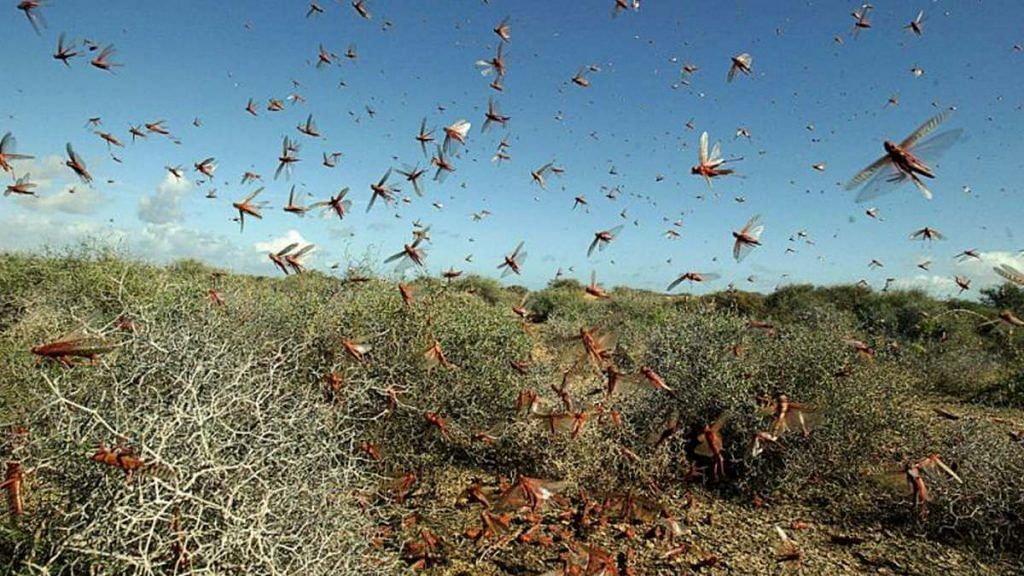New Delhi: The swarms of locusts from Pakistan that have invaded farms in parts of Gujarat and Rajasthan since December has resulted in an estimated loss of Rs 5 crore so far, ThePrint has learnt.
Most of the damage has been done to the crops of mustard, castor, cumin and wheat in the two states.
“We are looking at a loss of around Rs 5 crore until now. This is the biggest locust attack in Gujarat and Rajasthan since 1993-94,” an agriculture ministry official, who didn’t want to be named, told ThePrint.
The government is yet to do an assessment of the losses. Around 9,000 hectares of farmland in Gujarat and Rajasthan have been under locust attack.
“Though farmers whose more than one-third crops were destroyed by locusts will be compensated around Rs 7,000 per hectare, the formal damage assessment may take months to be completed,” the ministry official said.
The official added that it could take another week for the locust invasion to be brought under control completely.
A warning — ‘Desert Locust bulletin’ — was put out by the UN’s Food and Agriculture Organisation on 18 December, saying groups of adult locusts are expected to arrive in southwest Pakistan.
“Major sections of oilseed and cumin crop in Jalore and Jaisalmer districts have been destroyed in the locust invasion,” an agriculture department official from Rajasthan told ThePrint.
“The annual production of cumin only in Jalore district is 3 lakh quintal along with 10 lakh quintal of mustard and 7 lakh quintal of wheat. There is at least a one-third estimated loss of these crops in towns like Sanchor and Hadetar,” added the official.
Also read: Pakistan has been invaded by millions of locusts from Iran
Crop damage is not the only concern
Bal Ram Meena, the locust circle officer of Locust Warning Organisation (LWO) in Jalore district, told ThePrint, “The locust invasion has been checked on a war-footing but they migrate with the direction of wind so it might take another week or so to completely eliminate them from the district.”
Meena said that crop damage is not the only concern.
“To combat swarms of locusts, we have to spray hazardous and highly toxic chemicals like 96 per cent malathion along with 20 per cent chlorpyrifos (CPS) into a solution, which renders the crop useless even for animal consumption,” he added.
An agriculture department official of Gujarat said the locust invasion primarily happened in the north of the state.
The locusts entered Rajasthan through Pakistan and then spread across Banaskantha, Patan and Mehsana districts in north Gujarat, he told ThePrint.
“In Banaskantha district alone, until 30 December, 4,900 litres of pesticides have been sprayed over 5,000 hectares of crops. We are looking at widespread damage in wheat crops,” the official said.
In 2019, Banaskantha, Patan, Mehsana, Sabarkantha had seen 1.1 million hectares covered under rabi crops, with the highest irrigated crop being wheat — on 3,40,100 hectares.
Indian officials blame Pakistan
Another LWO official put the blame on their Pakistani counterpart.
“The Pakistani Locust watch centre did not inform us on time, therefore we couldn’t prepare effectively to counter it this time,” the official, who did not want to be named, said.
The official added that there were increasingly favourable conditions for breeding of locusts last year in Tharparkar, Nara and Cholistan located in the Las Bela area of Pakistan from where the swarms entered Gujarat and Rajasthan.
“However, they kept asserting that the situation was calm and not favourable for breeding of locusts,” the official said.
India established a permanent locust warning and control organisation under Indian Council of Agricultural Research in 1939. The LWO monitors locust scenario over desert areas in parts of Rajasthan and Gujarat. Its field headquarters is in Jodhpur. This apart, there is one Field Station Investigation on Locusts situated in Bikaner.
Also read: En route from Pakistan, army of locusts are set on their next target – Rajasthan
